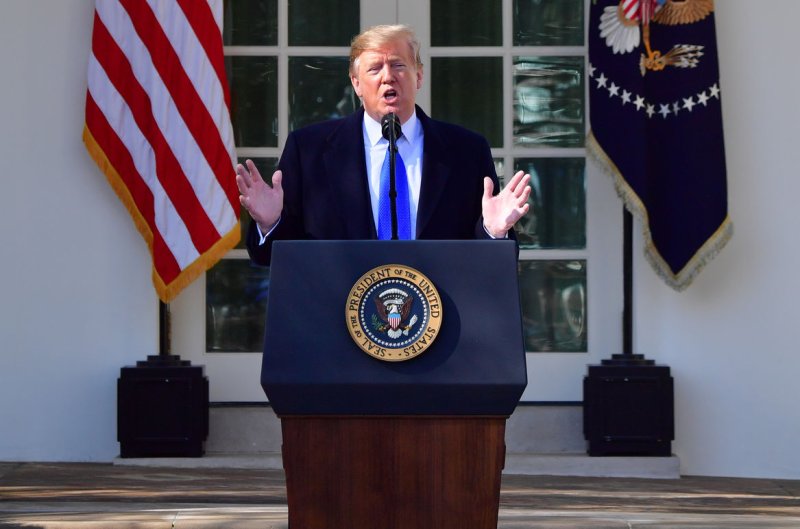1 of 3 | President Donald Trump speaks in the Rose Garden at the White House Friday, during which he declared a national emergency on the southern border. Photo by Kevin Dietsch/UPI |
License Photo
Feb. 15 (UPI) -- President Donald Trump signed a spending bill to avert a government shutdown Friday after declaring a national emergency on the U.S.-Mexico border to secure wall funding.
The declaration allows Trump to bypass Congress to divert billions of federal dollars to wall construction.
"We're going to confront the national security crisis on our southern border," Trump said in a Rose Garden speech at the White House. "We're talking about an invasion of our country with drugs, human traffickers, with all kinds of criminals and gangs. We need new wall."
Congressional Democrats, including House Speaker Nancy Pelosi, promised to fight the president's action in court.
In a joint statement, Pelosi and Senate Democratic leader Chuck Schumer called Trump's declaration constitutional overreach, saying Congress has exclusive power to control spending.
"The president's unlawful declaration over a crisis that does not exist does great violence to our Constitution and makes America less safe, stealing from urgently needed defense funds for the security of our military and our nation," the Democratic leaders said. "This is plainly a power grab by a disappointed president, who has gone outside the bounds of the law to try to get what he failed to achieve in the constitutional legislative process."
The Democratic leaders appealed to Republicans to join them in their defense of the Constitution.
"The Congress on a bipartisan basis must honor the Constitution by defending our system of checks and balances," they said. "The president is not above the law.
"The Congress will defend our constitutional authorities in the Congress, in the courts and in the public, using every remedy available."
Trump acknowledged in his remarks he expects to be sued and will likely get a "bad ruling" in lower courts. He predicted his move would be backed by the conservative majority on the U.S. Supreme Court.
He added that presidents in the past have had authority to issue executive orders since 1977 for "far less important things."
"There's rarely been a problem. They sign it," he said.
The first lawsuit to target his declaration came from Public Citizen, a consumer rights think tank representing the Frontera Audubon Society and three landowners in Texas whose land would be used for the new border wall construction.
"The complaint urges the court to find that Trump exceeded his constitutional authority and authority under the National Emergencies Act, and to hold that the declaration violates the doctrine of separation of powers that is so central to our Constitution," Public Citizen said.
Rep. Alexandria Ocasio-Cortez, D-N.Y., and Rep. Joaquin Castro, D-Texas, promised to introduce a joint resolution to stop Trump's effort. Castro, chairman of the Congressional Hispanic Caucus, said the resolution would "terminate" the declaration.
Castro said border crossings are at the lowest they've been in four decades and called Trump's claims "unfounded hype."
There is a mechanism for Ocasio-Cortez and Castro's resolution to stop the emergency. It must be reported out of committee of jurisdiction within 15 days and considered on the House floor after that. If approved, it would go to the Senate under an identical timeline for approval.
The U.S. Chamber of Commerce urged Trump to reconsider the move, citing the importance of checks and balances. The action could set a dangerous precedent that erodes federal government, it said.
"We have long fought against attempts by the executive branch to usurp the powers of Congress and to create law, such as we have seen in recent decades with the rise of the regulatory administrative state," CEO Thomas Donahue said in a statement. "We have also fought against attempts by the Congress to usurp the power of the executive."
Donohue said he's a proponent of immigration reform and border security and has been frustrated by the lack of progress in Congress. But an emergency, he said, isn't the answer.
Trump denied reports that the majority of illegal drugs are smuggled through official ports of entry.
"They go through areas where you have no wall," he said. "Everybody knows it."
The president credited the U.S. military for securing areas of the border with concertina wire and for breaking up two caravans.
Trump invited to the announcement several so-called "angel" parents, who have lost loved ones to crimes committed by undocumented immigrants.
"They're fighting for their children who have been killed by people who entered the country illegally," he said.
Trump opted for the emergency declaration when Congress refused to authorize billions to pay for the wall. On Thursday, lawmakers passed a spending bill to keep the government open past the Friday deadline, which included money to pay for 55 miles of barrier. The bipartisan bill passed both houses and was signed by Trump on Friday.
Trump said he planned to combine the money Congress has allocated with other funds diverted by presidential discretion -- about $8 billion, including money from the Treasury Department's drug forfeiture and interdiction program and the Defense Department's military construction budget.
The president's signing of the spending bill averts another costly shutdown. The last one, which spanned 35 days, ended Jan. 25 when the federal staffing shortage began seriously affecting U.S. air travel.















